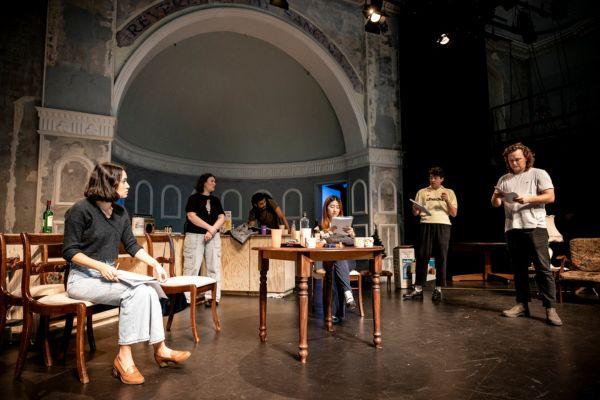Home, friends and forgiveness are just three of the themes in 'Never Closer' – the debut play from emerging Sydney writer Grace Chapple, playing at Belvoir St Theatre.
It's Christmas Eve, 1987 in Northern Ireland – the backdrop is the Irish Troubles.
Deirdre is stuck between arguments, nations, and the lives she almost lived. Growing differences between her old school friends push a powder keg, waiting for the tiniest spark, to the surface. Then, one of them turns up with her surprise fiance. . . Who is English.
What follows is a journey down a collision course with potentially no way back – one that could change all of their lives forever.
Is it possible to find light in the darkness?
Here, playwright Grace Chapple tells us more about her already multi award-nominated debut play, 'Never Closer' – which is directed by Hannah Goodwin.
This is your debut play. What can you tell us about ‘Never Closer’?
'Never Closer' is a love letter to old friends – the ones you don’t choose, the ones who’ve been in your life for so long you can’t remember how you ever became friends in the first place. Only in this case, the group of friends grew up in Northern Ireland in the '70s. Which makes things a little more complicated, especially when someone brings home their English boyfriend to meet the rest of the staunchly Republican group.
What was it that made you want to pen a play with this subject matter?
Moving away from home for the first time. I knew I wanted to write something about my mum, cause I’m a big sook and I missed the HECK out of her. She grew up during The Troubles, in a little town on Irish border where they had to leave the windows open so the frequent bombings wouldn’t keep shattering the glass. It felt important to me to understand this period, what it was like for her to live there in her most formative years, and, even harder to understand, why the others in her family never left. And then, I’d say missing my own friends made me choose this specific lens through which to explore the subject matter.

'Never Closer' rehearsals - Image © Brett Boardman
And how are you hoping audiences respond to the work?
If someone told their friends that they love them after the show I would be so stoked with that.
It premiered in 2022. How did that premiere season go, and what would you say is the most obvious change in the work since?
It went shockingly well. I was delighted and pretty surprised that story seemed to resonate so strongly with Australian audiences. It’s only because of that amazing feedback and word of mouth from those audiences that we’re getting the chance to go again – apparently it’s the first time in over a decade that Belvoir have transferred a work from their downstairs theatre into the big one, so we’re feeling incredibly lucky. The biggest change we’ve made since then is to the very end of the show, so for obvious reasons I won’t attempt to describe it. But I will say this; endings are hard! I’ve written more than ten entirely distinct endings to this play over the last few years. Sometimes I feel a little like I’ll rewrite the ending to this play every six months for the rest of my life. But we’re feeling pretty good about the one we’ve landed on. Should be a nice little surprise if there are any return customers from the original season.
What’s been the biggest challenge you’ve overcome since presenting the show for the first time?
Persuading Belvoir that the show had mainstage potential was probably our biggest obstacle in reaching this point. The original theatre we presented it in was very small, which gave the show a lovely intimate quality. I think a number of people had concerns about how it would translate to the larger space. But when I wrote it originally, I had always imagined it in a theatre like Belvoir upstairs. The scale of the drama allows for it, and it’s been amazing to see in rehearsals how the play expands with a little more breathing room.
As an emerging playwright, what sorts of stories and themes are you most passionate about covering?
Human stories, the ones about love, friendship, relationships; stories about good people who are bad at loving each other. I also try to write plays with something to say about the world we live in today. There’s always a social or political issue at the core, it’s just generally viewed through the lens of how it affects the way we live with one another.

'Never Closer' rehearsals - Image © Brett Boardman
When did you decide this was something you wanted to really pursue?
I knew I wanted to be a playwright in 2018. I used to want to be an actor, but I wasn’t very good at it – I actually only started writing plays because no one else was giving me good roles and I hadn’t quite figured out why. It was in 2018 that I acted in something I’d written for the first time, and I realised I liked the writing a lot more than the acting.
And what advice would you have for up-and-coming playwrights?
Two things. One – always write a story that you would love to read or see. You’re going to have to read back over it hundreds or thousands of times, much more than anyone else. The more you love it, the more you’ll want to work on it, and the better it will become. If you don’t love it, it will be torture. Two – take everyone out for coffee. Directors, producers, dramaturgs, other writers. And when you do, don’t treat it like a pitch meeting; try and actually get to know them, and whether you could work with them. Theatre is a team sport, and finding the right people to play with is half the battle.
What’s next for you?
I’m currently working on a new play for Belvoir! The team there are incredible, they’ve been so supportive of me as an artist at this crucial moment in my career, as well as giving me the freedom to spread my wings creatively. Hopefully you’ll be able to see the new one in 2025 or 2026.
'Never Closer' plays Belvoir St Theatre (Sydney) 25 May-16 June.

